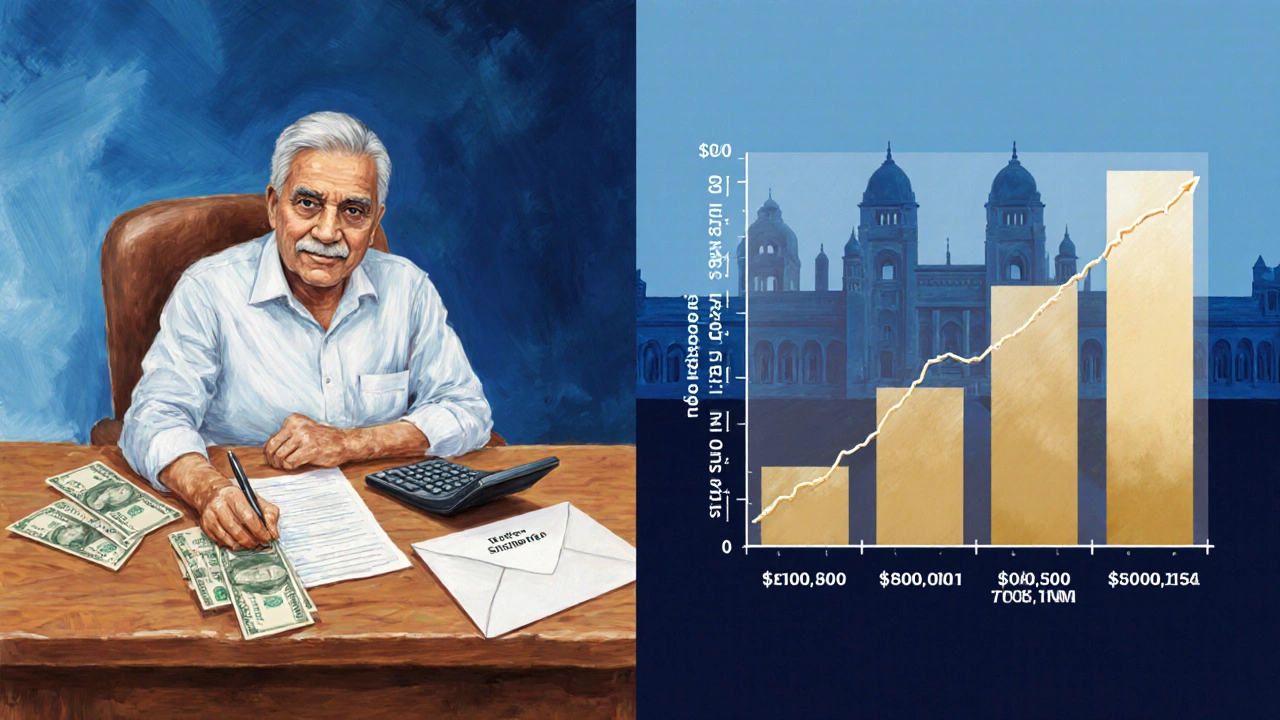Getting a Degree After 50: Is It Worth It?
 Oct, 23 2025
Oct, 23 2025
Degree ROI Calculator
Estimate Your Degree ROI After 50
Determine if pursuing a degree after 50 makes financial sense based on your current situation.
Results
Turning 50 often feels like a milestone that prompts a look back and a look forward. Some people start thinking about retirement, while others wonder if they still have time to chase a long‑standing dream of earning a university degree. The question isn’t just sentimental - it’s practical. Does investing time, money, and energy into a degree after 50 actually pay off?
Degree after 50 is a formal academic qualification pursued by individuals who are fifty years old or older. It can be a bachelor’s, master’s, or even a doctoral program, delivered full‑time, part‑time, or online. The goal ranges from career advancement to personal fulfillment.
Why Consider Studying at 50?
Age brings experience, but it also brings a clearer sense of purpose. Mature students report several advantages:
- Confidence boost: mastering new concepts proves you can still learn.
- Expanded network - classmates, professors, and alumni become valuable contacts.
- Higher employability - many employers value the soft skills that come with life experience.
- Potential for a career transition into a field you’re passionate about.
- Personal satisfaction - ticking that lifelong learning box.
All of these factors tie back to the broader concept of lifelong learning, a cultural shift that encourages continuous skill development regardless of age.
Financial Reality Check
Money is the biggest hurdle for many prospective mature students. Here’s how to break it down:
- Tuition cost: Traditional on‑campus programs can range from $10,000 to $30,000 per year in the U.S., while many Indian universities charge ₹1 lakh to ₹4 lakhs for a three‑year degree.
- Return on Investment (ROI): According to a 2023 study by the World Bank, graduates over 50 see an average salary increase of 12 % within two years, compared to 7 % for younger cohorts.
- Scholarships and grants: Several Indian institutions now offer scholarships for senior students, such as the “Maturity Scholarship” by the University Grants Commission (UGC). In the UK, the “Lifelong Learning Loan” covers up to £10,000.
- Part‑time and online options: Reducing tuition by opting for a part‑time schedule can cut costs by 30 % and also leaves room for employment.
When you add up potential earnings, the investment often becomes justifiable, especially if you’re targeting a higher‑paying role or a consultancy gig where a degree adds credibility.
Time Management Strategies
Balancing a degree with work, family, and health can feel overwhelming. Successful mature students adopt these habits:
- Pick an online learning platform that offers recordings, so you can study after dinner.
- Block 2‑3 hours each week for coursework and treat it like a non‑negotiable meeting.
- Communicate your schedule to family members - enlist their support for quiet study time.
- Use productivity tools (e.g., Trello, Notion) to track assignments and deadlines.
- Stay physically active; regular walks improve focus and stamina for long reading sessions.

Alternatives to a Full Degree
Not everyone wants to commit to a multi‑year degree program. In India, certificate courses India have exploded in popularity, offering focused, industry‑aligned training that can be completed in weeks or months.
| Aspect | Full Degree | Certificate Course |
|---|---|---|
| Duration | 3‑4 years (full‑time) or 5‑7 years (part‑time) | 4 weeks‑6 months |
| Cost | ₹1‑4 lakhs per year | ₹5 000‑₹50 000 total |
| Depth of Study | Broad, theoretical foundation | Skill‑specific, hands‑on |
| Recognition | Globally accepted academic credential | Industry‑focused, sometimes limited to employer awareness |
| Career Impact | Qualifies for managerial or academic roles | Boosts immediate job performance, good for up‑skilling |
If your goal is a quick upgrade - say, learning data analytics or digital marketing - a certificate might be the smarter route. But if you aim for a senior management position, a degree still carries more weight.
Real‑World Success Stories
Consider Ramesh, a 53‑year‑old electrician from Pune. He enrolled in a part‑time Bachelor of Science in Computer Applications at a local university while working night shifts. Within 18 months, he completed the degree, leveraged his new programming skills, and landed a junior developer role at a tech startup. His salary jumped from ₹3 lakhs per annum to ₹7 lakhs, and he now mentors other senior apprentices.
On the other side, Meera, 58, chose a six‑month certificate in Project Management from a reputable Indian institute. She used the credential to secure freelance consulting gigs, earning an additional ₹2 lakhs per month without the time commitment of a full degree.
Both paths illustrate that the right choice hinges on personal goals, financial bandwidth, and desired time commitment.

Decision Checklist: Is a Degree Right for You?
- Do I have a clear career or personal goal that a degree directly supports?
- Can I afford the tuition and possible income loss during study?
- Is there a flexible learning format (online or part‑time) that fits my schedule?
- Are there scholarships or employer reimbursement programs I qualify for?
- Would a shorter certificate provide a comparable ROI for my intended outcome?
If you answer “yes” to most of these, a degree after 50 is worth pursuing. If finances or time are tight, start with a certificate to test the waters.
Next Steps and Troubleshooting
Ready to take the plunge? Follow this short roadmap:
- Identify the field you’re passionate about - technology, finance, healthcare, etc.
- Research universities or institutions that offer flexible programs for mature students.
- Check eligibility for scholarships aimed at senior learners (e.g., UGC’s “Maturity Scholarship”).
- Calculate total cost vs. projected salary boost using the ROI data above.
- Enroll in an introductory module or a short certificate to gauge your learning style.
- Set a realistic study schedule and stick to it for at least 8 weeks before committing to a full degree.
If you hit a snag - be it budgeting, time, or motivation - consider these fixes:
- Financial: Apply for government loans, employer tuition assistance, or part‑time work on campus.
- Time: Swap one leisure activity per week for study; use commute time for podcasts or readings.
- Motivation: Join a mature‑student support group; share progress on social media for accountability.
Frequently Asked Questions
Can I get financial aid for a degree after 50?
Yes. Many governments, universities, and private foundations offer scholarships, low‑interest loans, or tuition waivers specifically for senior learners. In India, the UGC’s “Maturity Scholarship” covers up to 50 % of tuition for students over 50. In the UK, the Lifelong Learning Loan can fund up to £10,000.
Will employers value a degree earned at 55?
Employers increasingly recognize the blend of experience and formal education. A recent survey by LinkedIn showed that 68 % of hiring managers view a degree earned after 50 as a sign of commitment and adaptability, especially for leadership roles.
How long does it typically take to finish a part‑time degree?
A part‑time bachelor's program usually spans 5‑7 years, depending on credit load per semester. Many universities allow students to accelerate by taking summer courses, cutting the timeline by up to a year.
Are there health considerations for studying later in life?
Staying physically active, maintaining regular sleep, and taking short breaks during study sessions mitigate fatigue. Universities often provide counseling and ergonomic resources for mature students.
What’s the difference between a certificate and a micro‑credential?
Both are short, skill‑focused programs. A certificate is usually offered by a university or recognized institute and may carry academic credit. A micro‑credential is often industry‑issued, displayed as a digital badge, and focuses on a single competency.